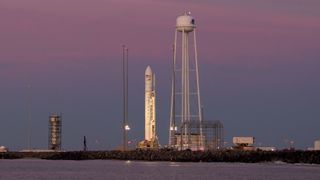Northrop Grumman Cargo Ship Launch to Space Station Delayed to November
The commercial resupply mission will launch no earlier than Nov. 2.

A Northrop Grumman Innovations Systems launch of a commercial cargo ship to the International Space Station for NASA on Oct. 21 will now liftoff on Nov. 2, NASA officials said.
The NG-12 Cygnus spacecraft is scheduled to launch to the International Space Station aboard an Antares rocket (also built by Northrop Grumman) on Nov. 2 at 9:59 a.m. EDT (1359 GMT) from NASA's Wallops Flight Facility on Wallops Island, Virginia, according to a NASA update. The mission, called CRS-12, will fly under Northrop Grumman's Commercial Resupply Services contract with NASA.
"This new target accommodates the expected departure at the end of October of the Japan Aerospace Exploration Agency's HTV-8 cargo vehicle and other activities at the space station," NASA spokesperson Keith Koehler of the Wallops Flight Facility told Space.com in an email. The launch was previously delayed until no earlier than Nov. 2, but has now been officially scheduled for Nov. 2, Koehler said.
Related: Antares Rocket & Cygnus Spacecraft Explained (Infographic)
The NG-12 mission will be the first Cygnus launch as part of the second phase of CRS flights, known as CRS2, awarded by NASA in 2016. This will be the first of at least six cargo delivery missions for NASA by Northrop Grumman with this second phase.
The disposable Cygnus spacecraft and Antares rockets have been flying cargo missions to the space station since 2013. NASA initially selected Orbital Sciences (later known as Orbital ATK and now as Northrop Grumman Innovation Systems) as one of two commercial cargo partners in 2008. SpaceX was the other company.
In 2016, NASA picked Northrop Grumman (then Orbital ATK), SpaceX and Sierra Nevada Space Systems, which is developing a small reusable space plane called Dream Chaser for its cargo flights. To date, only Cygnus and SpaceX's Dragon cargo ships have flown resupply flights for NASA's commercial cargo program.
Get the Space.com Newsletter
Breaking space news, the latest updates on rocket launches, skywatching events and more!
The International Space Station is currently kept stocked by an fleet of robotic cargo ships. In addition to Cygnus and Dragon vehicles, supplies are delivered by Russia's Progress vehicles and Japan's H-II Transfer Vehicles. The European Space Agency also flew five cargo missions with its own Automated Transfer Vehicle.
- Cygnus Spacecraft Departs Station, Begins New Mission in Orbit
- In Photos: SpaceX's Amazing CRS-18 Dragon Flight for NASA!
- Space Launch Calendar 2019: Sky Events, Missions & More
Follow Chelsea Gohd on Twitter @chelsea_gohd. Follow us on Twitter @Spacedotcom and on Facebook.
Join our Space Forums to keep talking space on the latest missions, night sky and more! And if you have a news tip, correction or comment, let us know at: community@space.com.

Chelsea “Foxanne” Gohd joined Space.com in 2018 and is now a Senior Writer, writing about everything from climate change to planetary science and human spaceflight in both articles and on-camera in videos. With a degree in Public Health and biological sciences, Chelsea has written and worked for institutions including the American Museum of Natural History, Scientific American, Discover Magazine Blog, Astronomy Magazine and Live Science. When not writing, editing or filming something space-y, Chelsea "Foxanne" Gohd is writing music and performing as Foxanne, even launching a song to space in 2021 with Inspiration4. You can follow her on Twitter @chelsea_gohd and @foxannemusic.
